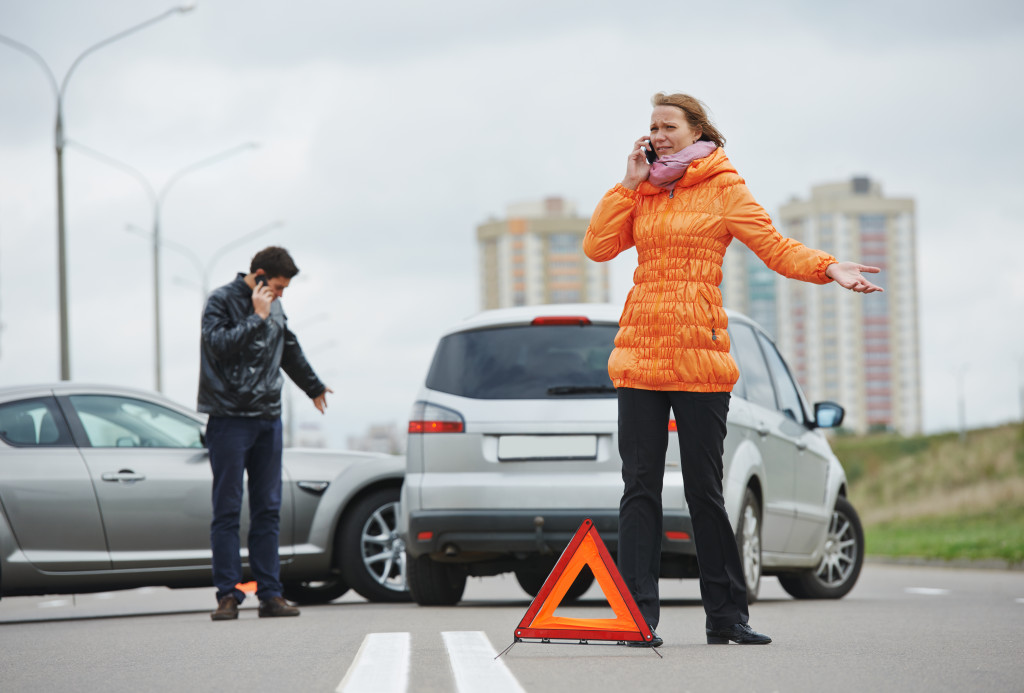- Check for any injuries, call 911 if needed, and get a police report.
- Exchange information with other drivers involved, take photos and videos of any damage done and collect skid marks as evidence.
- Notify your insurance company right away and have all required paperwork ready to submit.
- Understand your rights, such as seeking legal representation, filing a claim, refusing settlement offers, and maintaining privacy and respect.
Being involved in an auto accident can be a stressful and overwhelming experience. Knowing what steps to take immediately after the accident is essential, and how to handle your vehicle insurance claim is necessary. This guide will provide a step-by-step explanation of what you should do following an auto accident.
Check for Injuries and Call 911 if Necessary
The first thing you should do after an auto accident is check for any injuries. If anyone needs medical attention, call 911 right away. Even if no one was injured, it’s still wise to call the police to get a police report detailing the accident’s events. This report can be used when filing your insurance claim later on.
Exchange Information With Other Drivers Involved

Once you have checked for injuries and called the police, exchange information with the other drivers involved in the accident if necessary. Get their name, contact information, insurance provider, and policy number. Take photos or videos of any damage done to either vehicle and any skid marks or other evidence at the accident scene (if possible).
Notify Your Insurance Company
After exchanging information with other drivers involved in the accident, immediately notify your insurance company. They may require additional details about the incident such as pictures or police reports, so make sure you have those handy before calling them up. Once all the necessary paperwork has been submitted, they will begin processing your claim quickly and efficiently.
Understand Your Rights
Knowing your rights after a car accident is the first step to ensuring that you are treated fairly by all parties involved.
The Right to Seek Legal Representation
If you decide to take legal action following a car accident, one of your first steps should be hiring a personal injury lawyer specializing in auto accidents or personal injury cases. A qualified lawyer can make sure all relevant laws are followed during settlement negotiations and can also make sure that their clients are not taken advantage of by insurance companies looking for ways to reduce payouts for claims filed against them.
The Right to File a Claim
In most cases, individuals injured in car accidents can file a claim against the at-fault party for any damages incurred due to the crash. This includes medical expenses, lost wages, and pain and suffering.
To be successful with your claim, you must collect evidence from the scene of the accident—including photos of any property damage or injuries—as well as witness testimony from anyone present at the time of the crash. You should also document any communication with insurance companies or law enforcement officers regarding the incident.
The Right to Refuse Settlement Offers

Once your claim has been filed, you’ll likely receive settlement offers from either the other driver’s insurance carrier or your own insurance company if you were deemed partially at fault for the accident. While these offers may seem appealing at first glance, it’s often wise to refuse them outright as they rarely cover all costs associated with an auto accident.
Instead, consult with a qualified attorney before accepting any settlement offer so that they can help ensure that all costs associated with your auto accident are covered before signing on any dotted lines.
The Right to Privacy and Respect
After an accident, it’s vital that victims are respected and their privacy is maintained. As a victim of an auto accident, you have the right to expect that all personal information shared during the claims process will be confidential and not made public without your permission. You also have the right to expect to be treated with respect and courtesy by insurance company representatives and other drivers involved in the incident.
The Bottom Line
The aftermath of an auto accident can be confusing and intimidating, but by following this step-by-step guide, you can make sure that everything is taken care of properly and that all necessary paperwork is filed correctly with your insurance company.
Knowing what steps to take following an auto accident will help ensure that your rights are being protected and that you receive full compensation from your insurer for any damage done to your vehicle or property due to another driver’s negligence or recklessness.

